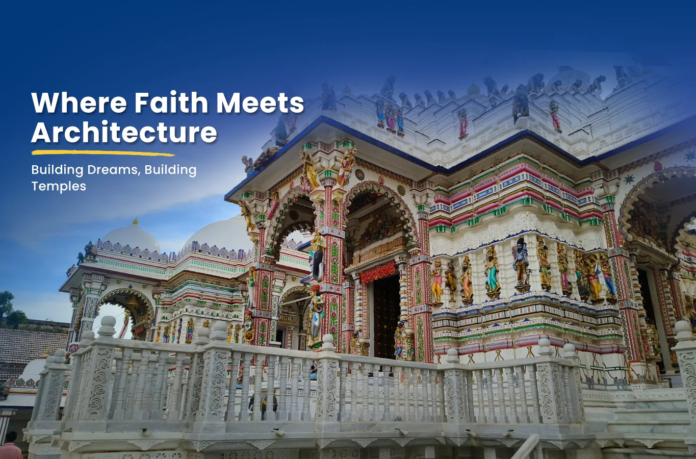Jain temples are renowned worldwide for their intricate craftsmanship, spiritual depth, and architectural brilliance. These temples are not just places of worship; they are timeless masterpieces that reflect the profound philosophy and principles of Jainism. This article explores the beauty and meaning of Jain Temple Architecture, the role of Temple Architects in India, the legacy of Jain Temple Sompura artisans, and the excellence of Temple Construction Services in Gujarat.
The Foundations of Jain Temple Architecture
The Philosophy Behind Jain Temples
Jain temple architecture embodies the principles of simplicity, purity, and non-violence central to Jainism. Every element of a Jain temple, from its design to its placement, symbolizes the spiritual journey toward liberation (moksha). The temples are designed to create an atmosphere of peace, encouraging meditation and self-reflection.
The garbhagriha (sanctum sanctorum), which houses the idol of the Tirthankara (Jain spiritual leader), is the focal point of the temple. Surrounding it are intricately carved halls and corridors that guide devotees toward spiritual enlightenment.
Regional Styles of Jain Temples
Jain temples in India exhibit diverse architectural styles influenced by geography and local traditions. However, the fundamental principles of symmetry, geometry, and intricacy remain consistent. Key regional styles include:
- Western India (Rajasthan and Gujarat): Marble temples with detailed carvings, like the Dilwara Temples.
- Southern India: Dravidian-style temples with ornate towers (gopurams).
- Central India: Nagara-style temples with shikhara (tapering spires).
The Role of Temple Architect in India
Sthapatis: Masters of Temple Design
In India, temple construction is guided by Sthapatis, or temple architects, who possess expertise in sacred geometry, sculpture, and Vastu Shastra. These architects ensure that every structure adheres to spiritual and architectural principles.
Sompura Architects: Custodians of Jain Heritage
The Sompura community stands out as a symbol of excellence in temple construction. With a legacy spanning centuries, Jain Temple Sompura architects are known for their unparalleled craftsmanship and intricate stonework. They have been instrumental in constructing some of the most iconic Jain temples, such as:
- Ranakpur Jain Temple (Rajasthan): Known for its 1,444 uniquely carved pillars.
- Dilwara Temples (Mount Abu, Rajasthan): Celebrated for their stunning marble work.
- Palitana Temples (Gujarat): A cluster of exquisitely designed Jain temples on Shatrunjaya Hill.
The Sompura architects bring a deep understanding of Jain philosophy, ensuring that every temple reflects its spiritual essence.
Symbolism in Jain Temple Design
Geometry and Sacred Space
Jain temples are meticulously planned using geometric principles to symbolize cosmic harmony. The mandala, a sacred geometric diagram, is often used as the blueprint for temple layouts. The temples’ symmetrical designs represent balance and order, mirroring the Jain philosophy of equilibrium in life.
Intricate Carvings: A Spiritual Journey
Every carving in a Jain temple tells a story. From depictions of Tirthankaras to intricate floral patterns, these designs are not just decorative but hold deep spiritual meanings. Common motifs include:
- Lotus flowers: Symbolizing purity and detachment.
- Kalpavriksha (wish-fulfilling tree): Representing prosperity and enlightenment.
- Celestial beings: Indicating divine presence and protection.
Temple Construction Service in Gujarat: Excellence in Craftsmanship
Gujarat’s Contribution to Jain Temple Architecture
Temple Construction Service in Gujarat has long been a hub for Jainism and its architectural wonders. The state is home to some of the most magnificent Jain temples, showcasing both traditional craftsmanship and modern construction techniques.
Features of Temple Construction Services in Gujarat
- Expert Artisans: Gujarat boasts a rich tradition of skilled artisans, particularly from the Sompura community.
- Quality Materials: The state’s access to high-grade marble and sandstone enhances the durability and beauty of its temples.
- Innovation Meets Tradition: Temple construction services in Gujarat blend ancient methods with modern technologies to achieve precision and efficiency.
- Preservation Efforts: Many services focus on restoring historic Jain temples while maintaining their original grandeur.
Iconic Jain Temples in Gujarat
- Shatrunjaya Hill (Palitana): Home to over 800 intricately carved Jain temples, it is a major pilgrimage site.
- Hutheesing Jain Temple (Ahmedabad): Known for its elegant marble design and serene ambiance.
- Taranga Jain Temple: Nestled in the Aravalli hills, this ancient temple is an architectural marvel.
The Spiritual Significance of Jain Temples
A Place for Meditation and Enlightenment
Jain temples are designed to foster an environment of inner peace. The placement of idols, the flow of light, and the temple’s acoustics are all intended to aid meditation and contemplation.
The Journey to Liberation
The structural elements of a Jain temple often symbolize the path to moksha. For instance:
- Steps leading to the temple: Representing the ascension toward spiritual awakening.
- Corridors and halls: Encouraging introspection and mindfulness during the journey.
Challenges and Innovations in Modern Jain Temple Architecture
Balancing Tradition and Modernity
Modern Jain temples aim to preserve traditional designs while meeting contemporary needs. Challenges include urban constraints, environmental concerns, and maintaining authenticity.
Sustainable Practices in Temple Construction
Leading Temple Construction Services in Gujarat have adopted eco-friendly practices, such as using renewable materials, solar energy, and water recycling systems. These initiatives align with Jainism’s emphasis on environmental harmony.
Conclusion
Jain temple architecture is a celebration of art, spirituality, and devotion. Through its intricate carvings, symbolic designs, and serene ambiance, each temple stands as a testament to the Jain philosophy of non-violence, purity, and liberation.
The contributions of Temple Architect in India , particularly the Jain Temple Sompura community, have been instrumental in preserving this architectural heritage. With the expertise of Temple Construction Services in Gujarat, the legacy of Jain temples continues to inspire and captivate generations, bridging the gap between ancient traditions and modern aspirations.


